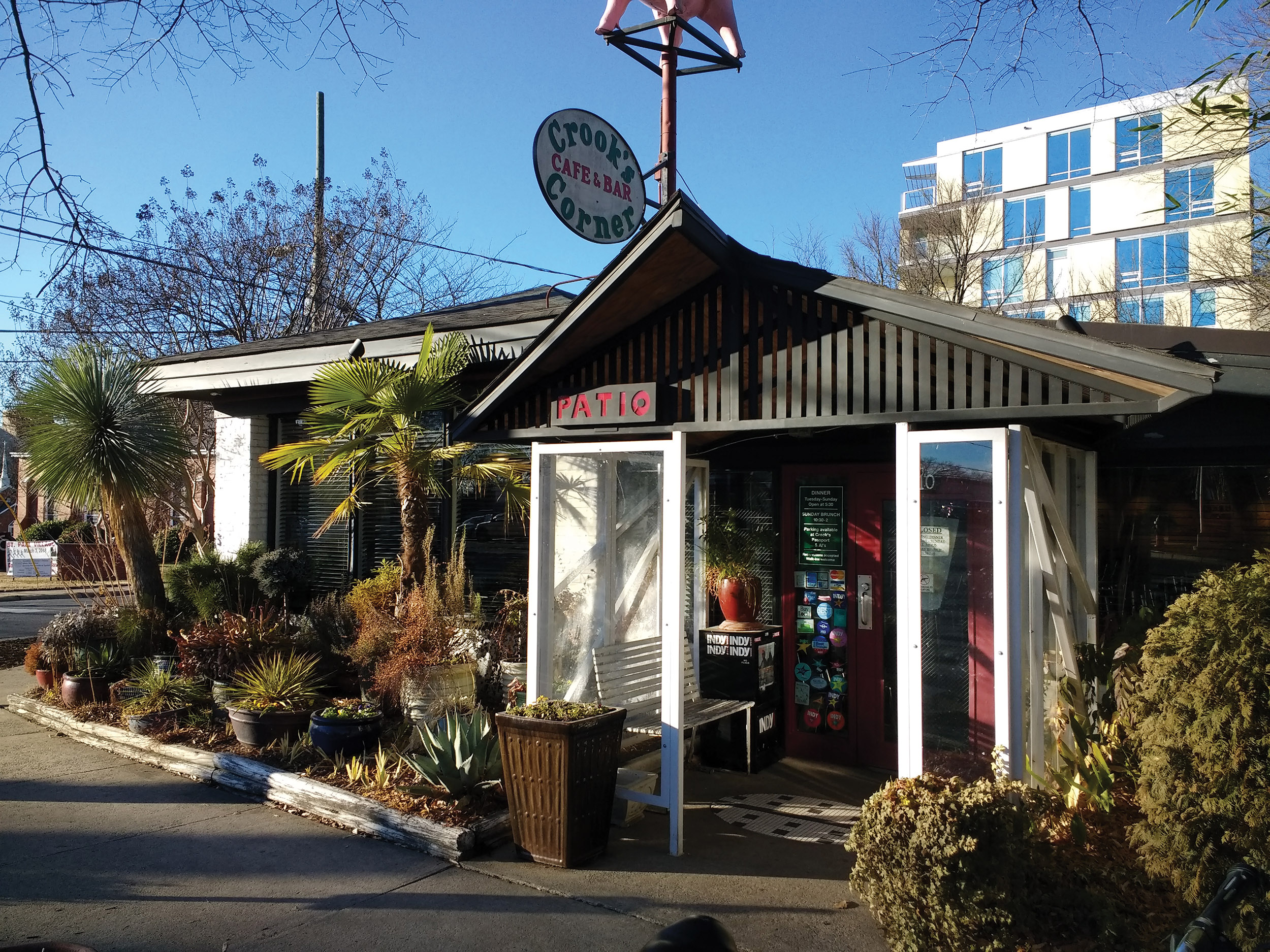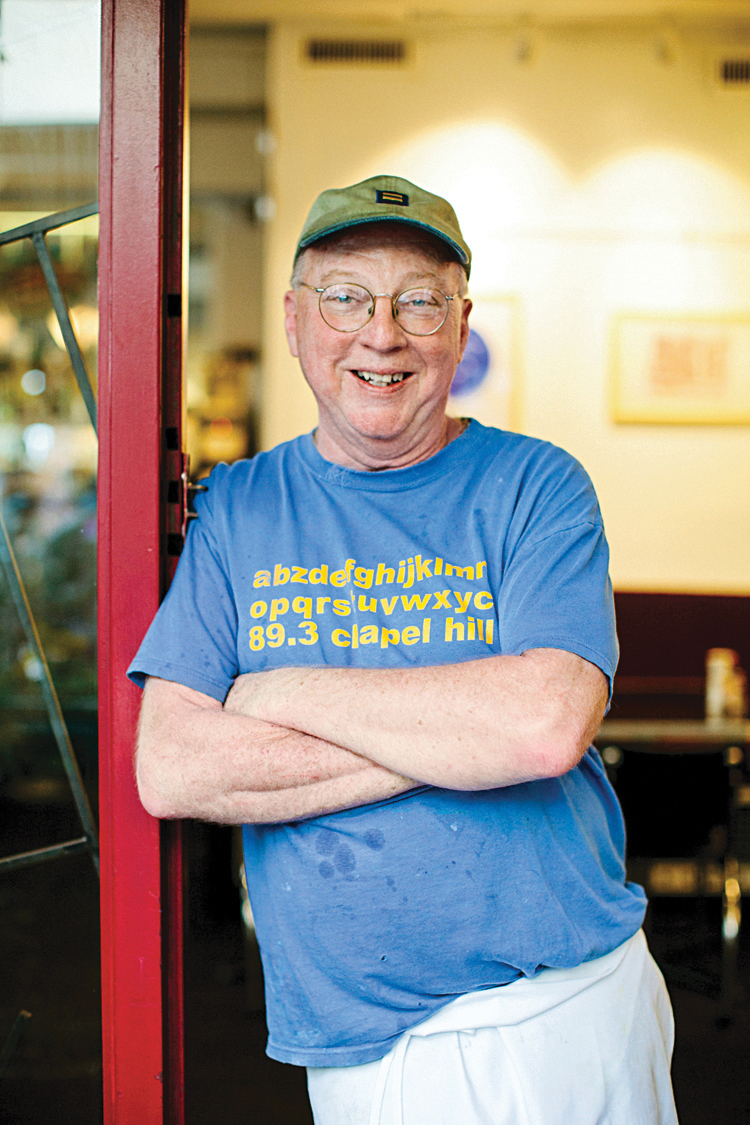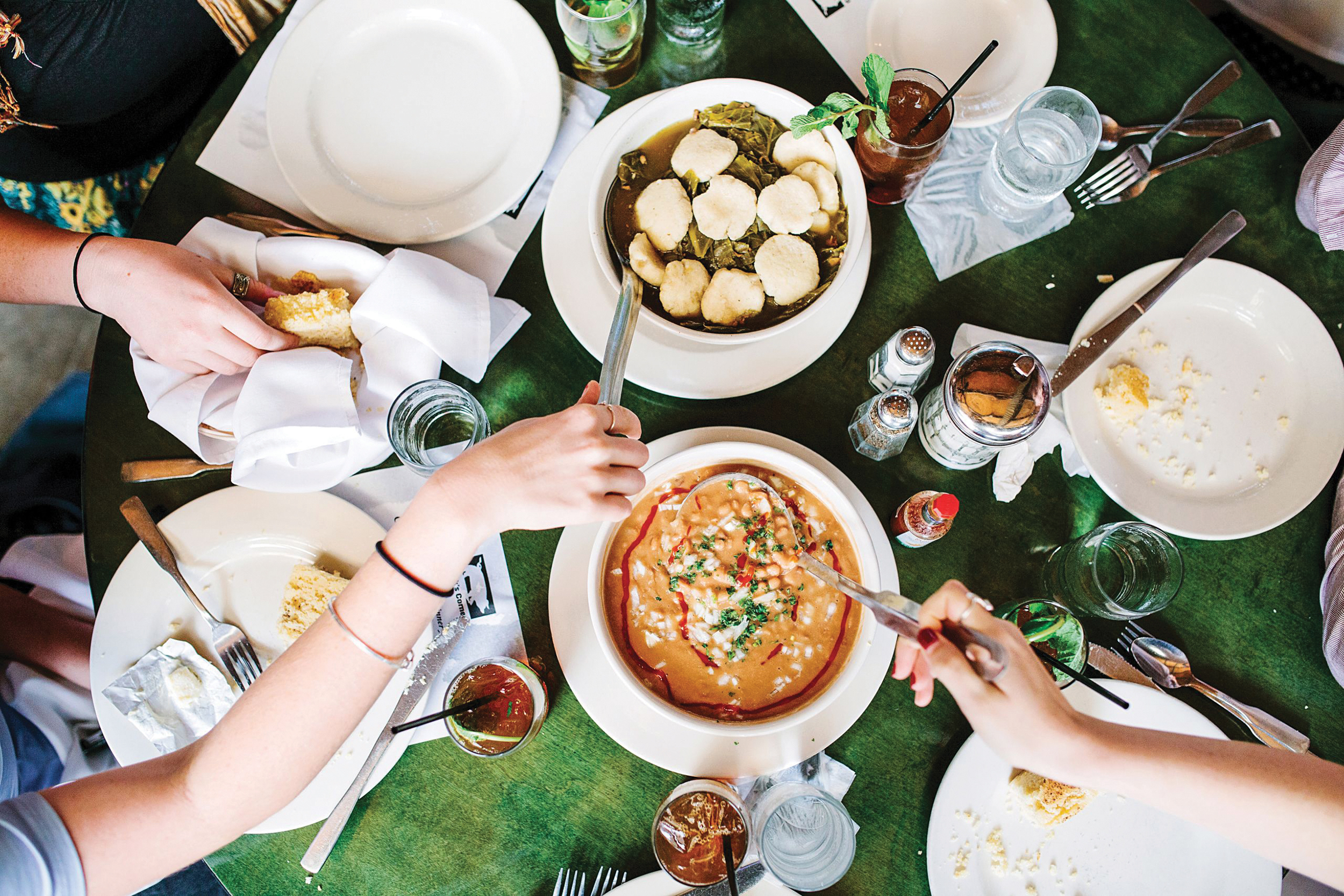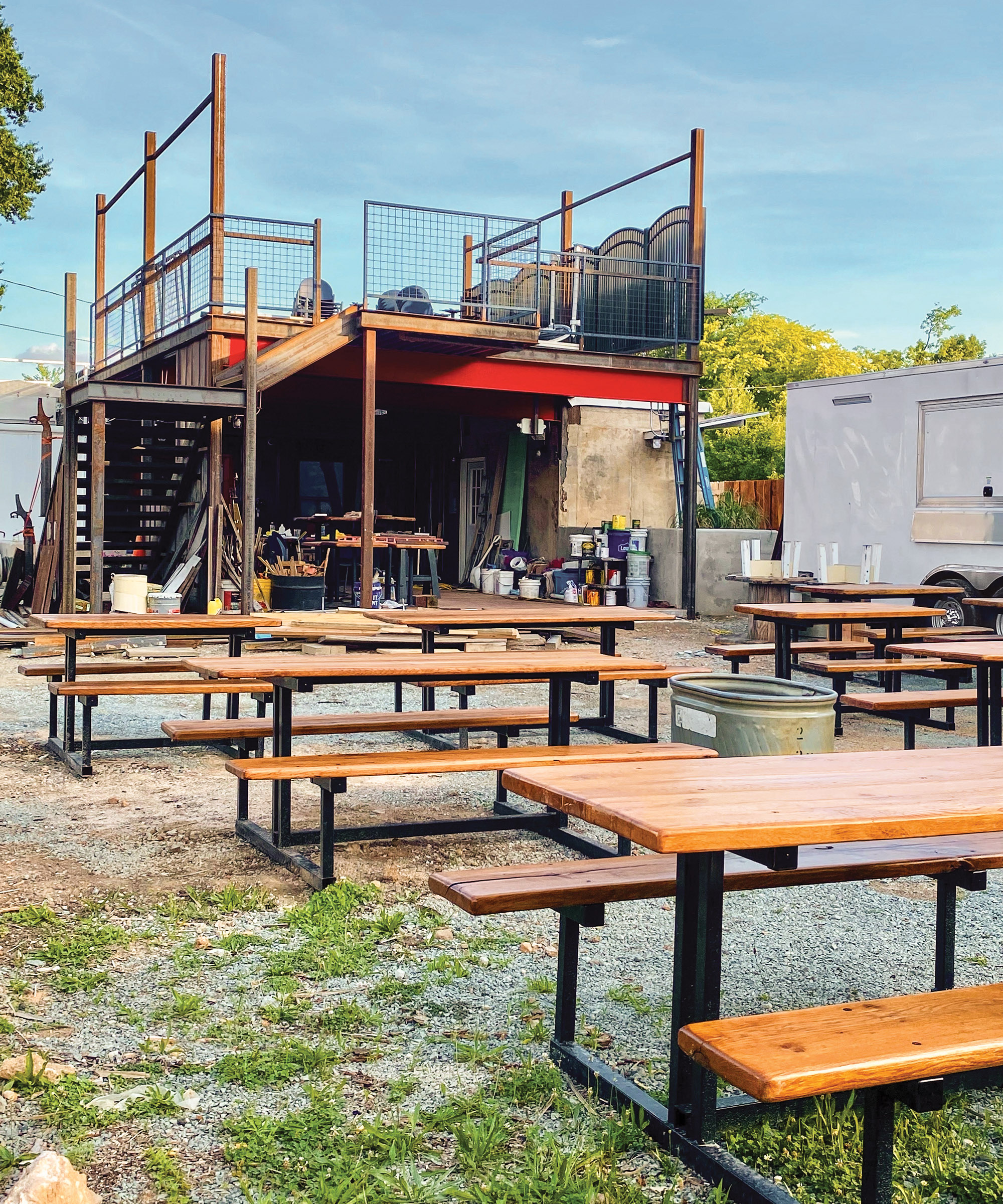Culinary Landmark Crook’s Corner Closes
Posted on July 29, 2021
The low-slung Crook’s Corner building became a landmark, but its age and condition also put a strain on the restaurant’s financial outlook. (Max Granger/Wikimedia Commons)
Crook’s Corner came so close to surviving the pandemic.
The governor had lifted COVID-19 restrictions. Restaurants had begun welcoming diners back inside, and people hungry for a night out and a meal prepared by a professional came ready to spend. The dark times seemed past.
But not for Crook’s. Amid the optimism elsewhere downtown, the 40-year-old restaurant that became a hometown favorite and national culinary landmark locked up after dinner June 8 and the next afternoon announced it would not reopen. It had served its last platter of shrimp and grits, its last slice of Atlantic Beach pie.
Restaurateurs up and down Franklin Street lowered their hearts to half-staff.

Former longtime chef Bill Smith ’72 infused the menu with flavors such as honeysuckle sorbet. (Anna Routh Barzin ’07)
“You hate to see Crook’s closing,” said Kyle Shea, general manager of Carolina Coffee Shop, the oldest restaurant downtown. “All of us restaurants were in this together. We had a Facebook group; we’d make suggestions about how to save cost without sacrificing quality. We worked together to get through this. I hate it that one of the places don’t make it, especially one with as much history as Crook’s.”
In 1982, Gene Hamer ’73 opened Crook’s with former La Residence chef Bill Neal running the kitchen in a ramshackle single-story place so far west on Franklin Street it almost crossed the line into Carrboro just around the curve. A couple years later, a review in The New York Times by legendary critic Craig Claiborne set Crook’s pin on the national map for epicureans. It became one of the most celebrated eateries in the South, somehow elevating comfort food to classy cuisine — in a building that had originally housed Rachel Crook’s fish and produce market and was topped with a pink pig sculpture left over from its days as a barbecue and hamburger joint.
After Neal died in 1991, Hamer persuaded Bill Smith ’72, another chef from La Residence a few blocks away on West Rosemary Street, to helm the stoves at Crook’s. For more than 25 years, Smith infused its menu with his own flavor of New South cuisine, such as a seasonal honeysuckle sorbet.
In 2017, the building’s owner died, and the heirs agreed to sell it to a group of seasoned restaurateurs, including Gary Crunkleton ’96, owner of The Crunkleton cocktail bar up the street, and Shannon Healy, owner of Alley 26 bar and restaurant in Durham. Smith retired in 2019, passing his apron to Justin Burdett, named a “Chef on the Rise” by Food & Wine magazine.
Earlier this year, Carrie Schleiffer, executive chef of Alley 26, added Crook’s kitchen to her domain, and some of her signature dishes — chicken liver mousse and cornmeal fried oysters — appeared at Crook’s. In short order, her farro risotto with butternut squash, Brussels sprouts, mushrooms, arugula and parmesan had become a favorite as well.
But on June 9, just before storm clouds pushed aside the sun on a sultry afternoon in Chapel Hill, Crook’s owners posted the announcement of the closing on Facebook.
“With an incredibly heavy heart I must share the news that we are closing,” the statement read in part. “The position we find ourselves in, exacerbated by the Covid-19 crisis is no longer tenable. … On behalf of generations of Crook’s Corner staff, we thank you for your many years of support.”

Crook’s Corner elevated Southern comfort food to classy cuisine. (Anna Routh Barzin ’07)
The statement acknowledged the memories of thousands of celebrations and “pivotal career moments for too many of us to count.”
“It has been an incredible honor to both serve our community in our place and serve [as] Chapel Hill’s culinary ambassador to the wider world.”
The next day, Healy said that the decision was one that he and his partners had been trying to forestall.
“It came down to debt service,” he said. “We tried to refinance some debt or get some relief … so we could reinvest substantially more money into the business so we could have a future. We couldn’t do that. We could either pay off debt or invest money in going forward. But if we paid off the debt, there was no money to go forward.”
He continued: “This is a very old building. Everything about it needs replacing or repair. Without a huge influx of cash to do that, the business doesn’t have a future. … It’s not that we almost made it. We accrued debt during [the government-mandated] down time. The debt we should have been paying during the pandemic was called for payment, and we couldn’t pay. …
“The unfortunate timing of it was we had just righted the ship with food and staffing. Everything the guests could see on the front end was better than it’s been in years. But we can’t escape the debt-service issue.”
He said that he and his partners “tried incredibly hard to keep the institution here as part of Chapel Hill” and that they are thankful for the community’s support.
“Forty years is a long time for this kind of business to stay open. It wasn’t an absence of community support that caused us to close. It’s not on them.”
— Nancy E. Oates
More:
Former longtime Crook’s Corner chef Bill Smith ’72 talked about the restaurant’s place in Chapel Hill culinary history as a guest host on the webinar series Downtown Chapel Hill: Then, Now and Always, presented by the GAA and the Chapel Hill Downtown Partnership; $5 fee per episode supports the partnership’s Experience Downtown Chapel Hill, an initiative aimed at supporting businesses affected by COVID-19, as well as encouraging customers to safely return downtown.
Smith shared his recipe for honeysuckle sorbet in the Review’s July/August 2014 food issue.
From Car Lot to Beer Garden
Mike Benson was having lunch at one of the picnic tables outside Al’s Burgers last year when he noticed someone pounding a “For Lease” sign into the ground in front of the Franklin Street Auto lot across West Franklin Street.

Franklin Motors Bar Lot‘s porch and garden will seat nearly 100, the roof deck another 25. The former office is now a bar and restrooms, and the place has its own food truck. (Mike Benson)
Benson had been building restaurants and consulting since selling Southern Rail and The Station in Carrboro in 2015 and had owned and operated two restaurants in Washington, D.C., before that. So he walked over to talk with the lot owner. By the time their conversation ended, Benson said: “Pull that sign out; I’ll take it.”
With all of the open space, he conceived a beer garden setup for Franklin Motors Bar Lot, converting the little office building into a bar and a couple of restrooms. He added a steel-and-concrete porch and garden area that seats nearly 100, with another 25 on the roof deck.
Food trucks came calling, offering to supply food to accompany the on-tap brews (he purchased the tap system from the Mellow Mushroom down the street when it closed). But scheduling transient food trucks would be an extra complication, so he bought one, called Roquette, and parked it next to a commissary kitchen he built. He and chef John Smith are planning a menu of sliders, brats, chicken wings, oyster roasts and “bold cuisine.” One of the taps will spout prosecco to make mimosas by the pitcher for weekend brunch.
The last step is getting the liquor license, which he hopes to have approved and be able to open by midsummer.
601 W. Franklin St. | franklinmotors.net
Music Store Adds Late-Night Ambience
Stephen Judge started 2020 with a concept and a building permit and began transforming a former ice cream shop next to his Schoolkids Records store into Spindle, a beer bar for vinyl records fans.
Just at the point where invoices from contractors, tradespeople and suppliers came due — but before the town issued his certificate of occupancy — the pandemic arrived, and the governor issued a stay-at-home order. Judge hunkered down in Ireland with his partner in her home country and set to work shifting Schoolkids’ inventory to online sales.
 When pandemic restrictions were lifted recently, Judge’s business associate, Daniel Matti, manager of Schoolkids’ Raleigh store, got the kegerator (a refrigerator for beer kegs) up and running and the bar spiffed up. After final inspections and ABC approvals, “the suds will flow,” Matti said.
When pandemic restrictions were lifted recently, Judge’s business associate, Daniel Matti, manager of Schoolkids’ Raleigh store, got the kegerator (a refrigerator for beer kegs) up and running and the bar spiffed up. After final inspections and ABC approvals, “the suds will flow,” Matti said.
Spindle and Schoolkids occupy a contiguous space but will have different hours. Customers can browse music titles, then have a beer during the day. Once the music sales side closes at 7 p.m., it will be roped off, but beer will continue to be served until about 11 p.m. on weekends. Spindle also has a TV in the corner to show sporting events.
They were rushing to open Spindle by Record Drop Day, when labels release some 400 new titles on the same day. Typically held in August, this year it was split into two days — June 12 and July 17 — to reduce crowd sizes in the ongoing pandemic. Record Drop Day can generate more sales for Schoolkids than the entire month of December holiday business.
Business has remained healthy at Schoolkids during the pandemic, once the operation was able to transition to online sales. It has seen a huge uptick in sales of record players and vinyl records. “People had the disposable income to splurge on a record of a band they wish they could see live,” Mattis said.
405 W. Franklin St. | schoolkidsrecords.com
Chicken and Waffles Shop a Long Time in the Wings
Damion Moore didn’t waffle on opening a fourth branch of his popular Durham, Greensboro and Cary diners, Dame’s Chicken and Waffles, in Chapel Hill. In 2019, he took over the space left vacant by [B]ski’s sandwich shop and began renovating it into a counter-style eatery. But the pandemic put the opening on a back burner.
With the state’s pandemic restrictions recently lifted, Dame’s was ready to fly. The soft opening took place in May with limited hours. Moore joins other small businesses in the quest to find employees, and once Dame’s is closer to full staff, he is extending hours.
Dame’s serves fried chicken set in a nest of “almost world famous waffles,” as its menu says, along with a selection of flavored-butter “schmears.” When the kitchen is fully staffed, Moore plans to work on creating dishes exclusive to the Chapel Hill store.
147 E. Franklin St. | dameschickenwaffles.com
Independent Restaurant Turns Tables on Franchise Site
Two restaurateurs are flipping the trend of chains pushing out independent eateries. Andreas Handrinos and Stuart Pannill partnered to convert what had been a Pizza Press franchise at Carolina Square into /sôst/ (pronounced “sauced”). And that’s what the menu is based on — every dish starts with a sauce.
The /sôst/ menu will retain the individual pizzas that drew customers to Pizza Press but will add a build-your-own component of sauces on pasta, wings, subs and salads.
Earlier this year, Handrinos and Pannill opened Iron Oaks Taproom in a new mixed-use development in Raleigh, pairing a tapas menu with golf simulators for a different type of sports bar. Handrinos had managed the Bronx Brewery taproom in New York for many years. Pannill honed his culinary skills in Jackson Hole, Wyo., kitchens.
They plan to use the storefront space to display the works of local artists.
133 W. Franklin St. | kpanns.com/sost
Clothing Shop Departs
Gentlemen’s Corner bowed out of the 140 West complex at 140 W. Franklin St. and has moved to 107 Edinburgh Drive in Cary. The franchisee had been considering a move for a while, and the arrival of the pandemic last summer — with students’ departure, few faculty on campus and no sporting events to bring alumni back to town — cinched the decision.
— Nancy E. Oates
Thanks for reading the Carolina Alumni Review
Carolina Alumni members, sign in to continue reading.
Not yet a member? Become one today.
